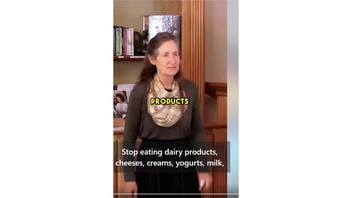
Does dairy consumption lead to calcium deficiency due to acidity, as a video on Facebook claims? No, that's not true: The International Osteoporosis Foundation writes that milk and other dairy foods are not acid-forming and do not leach calcium from the bones. A registered dietician who is a spokesperson for the Academy of Nutrition and Dietetics told Lead Stories that human bodies do not make calcium and cow's milk is one of the best dietary sources for humans.
The claim originated in a video (archived here) shared to Facebook on March 22, 2204, featuring controversial naturopath Barbara O'Neill. The video's caption read, "Do you consume cow's milk?"
Here is how the post appeared at the time of writing:
(Source: Facebook screenshot taken on Thu Apr 11 18:40:37 2024 UTC)
Melissa Prest (archived here), a Chicago-based registered dietician nutritionist and spokesperson for the Academy of Nutrition and Dietetics (archived here), a trade organization, told Lead Stories in an email received on April 11, 2024, that calcium is an essential mineral and, because the human body doesn't make it, "cow's milk is one of our best dietary sources." She added:
Cow's milk is considered a high biological value protein meaning that it contains many of the essential amino acids, the building blocks of protein, needed by our bodies. How fast our body absorbs and uses the protein in milk varies by the type of protein. ...
In contrast to the [O'Neill] video, our bodies absorb the protein and calcium from cow's milk. We should pair dietary calcium sources with vitamin D for best absorption and be cautious of consuming too much dietary sodium since it tends to contribute to calcium loss which causes bone loss.
The International Osteoporosis Foundation writes (archived here) that it is not true that milk and other dairy foods are bad for bone health, because most are not "acid-forming." Milk and dairy foods do not leach calcium from the bones. The foundation adds that:
Milk and yoghurt are not 'acid-forming' foods. They produce a neutral residue when digested. In contrast, hard cheeses such as parmesan and cheddar are acid-forming. The acid-produced from consuming hard cheeses can be neutralized by ingestion of more fruits and vegetables. ...
If your calcium intake is too low to maintain adequate calcium blood levels, calcium will be released from your bones and this can weaken them.
In the video, O'Neill also stated that "the countries in this world that consume the most dairy products have the highest incidence of osteoporosis." The foundation says this statement is incorrect. Many factors, such as genetics and lifestyle habits, determine when a person will develop osteoporosis.
Experts agree milk is important source of calcium
In the U.S., dairy is considered its own food group. According to the 2020-25 Dietary Guidelines for Americans (archived here), adults should ingest three servings daily. Experts agree that milk and other dairy products are an important source of calcium.
Grace Clarke, a spokesperson for The Royal Osteoporosis Society (archived here), referred Lead Stories to the organization's calcium recommendations (archived here), which lists "calcium-rich foods," such as "dairy products, like milk and cheese."
The USDA nutrition program My Plate (archived here) also writes that "eating or drinking dairy products offers health benefits, like building and maintaining strong bones" and provides vital nutrients, including calcium. An estimated 90 percent of Americans do not consume enough dairy.
According to a 2021 review (archived here) of global dietary recommendations, dairy foods "standout for providing an unmatched package of essential nutrients" that supports "a global public health strategy, with the potential to help reduce global disease burden."
The International Osteoporosis Foundation (archived here) writes that milk and dairy products are important for bone health, provide vital calcium, and are the "most readily available sources of calcium."
Excess salt may deprive the body of calcium
In the video, O'Neill falsely stated that calcium should be consumed through "whole salt" rather than through dairy products because the latter is "sulfur waste" that is "very acid," adding that the body uses calcium to "negate acidity."
Table salt is not an adequate source of calcium. One teaspoon of table salt contains just 1.44 milligrams of calcium, according to University Hospitals of Ohio (archived here). The National Institutes of Health (archived here) writes that adults should consume around 1,300 milligrams of calcium daily.
Table salt, also known as sodium chloride, comprises about 40 percent sodium and 60 percent chloride, according to the Harvard T.H. Chan School of Public Health (archived here). Though some salt is necessary for the body to function, the Food and Drug Administration (FDA) writes (archived here) that too much can cause high blood pressure, heart disease and stroke.
"Americans eat on average about 3,400 mg of sodium per day. However, the Dietary Guidelines for Americans recommends adults limit sodium intake to less than 2,300 mg per day," the FDA wrote (archived here).
Diets rich in sodium can deplete calcium in the body, according to researchers from the University of Alberta Faculty of Medicine & Dentistry (archived here) in 2012.
"If we consume too much dietary salt, we lose calcium in our urine, which can lead to bone loss," Prest said.
High levels of calcium in urine can also lead to the development of kidney stones, while inadequate calcium in the body can lead to thin bones and osteoporosis.
O'Neill is prohibited from practicing health care in New South Wales, Australia
The video in question was posted to a Facebook page (archived here) dedicated to O'Neill. As Lead Stories has previously reported, O'Neill is well known in the alternative medicine community but was permanently prohibited by the New South Wales Health Care Complaints Commission (HCCC) in 2019 from practicing any form of health care after an investigation concluded that her spread of misinformation breached New South Wales, Australia's Code of Conduct for Unregistered Practitioners. A statement from the HCCC, following an investigation, said:
The Commission is satisfied that Mrs O'Neill poses a risk to the health or safety of members of the public. The Commission therefore makes the following prohibition order:
Mrs O'Neill is permanently prohibited from providing any health services, as defined in s4 of the Health Care Complaints Act 1993 (the Act), whether in a paid or voluntary capacity.
In a news release published on September 24, 2019, HCCC stated that O'Neill made "dubious and dangerous health claims" that were "not evidence based or supported by mainstream medicine."
Lead Stories has debunked other claims made by O'Neill, including claims that castor oil can "break up" gallstones or kidney stones, that water is the most powerful blood thinner and that a "potato poultice" is effective treatment for tissue inflammation. Other fact checks related to O'Neill can be read here.


















